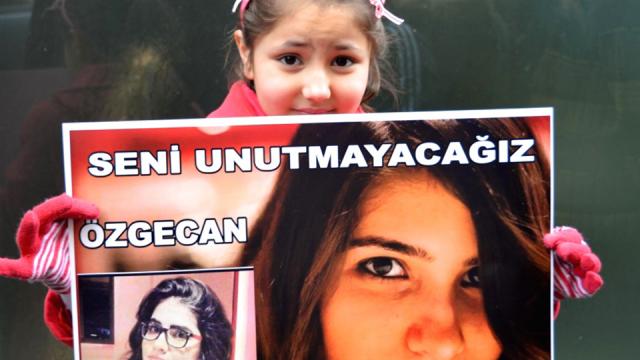
The Feb. 11 murder of a 20-year-old woman who resisted a rape attempt has erased longstanding taboos and empowered women to confront endemic violence against women in Turkish society.
Psychology student Ozgecan Aslan was by all accounts the last passenger on a minibus in southern Mersin province when she was attacked by the driver. She resisted – using a can of pepper spray – but was overpowered, stabbed and beaten to death. The 45-year-old man and his two accomplices later confessed to the crime after her mutilated and burned body was found dumped in a riverbed.
Condemnation of the killing was swift – and universal – but it’s also laid bare deep inequalities in Turkish society that encourages women to keep silent about abuse. Turkey’s leadership has proposed severe punishment, and in a country whose judiciary is under constant political pressure it is unlikely the accused will get off lightly.
“I'll have a meeting with the Minister of Justice today,” President Recep Tayyip Erdogan vowed Tuesday. “We will go all out to make sure that these villains would take the heaviest sentences.”
Other ruling party figures proposed reintroducing capital punishment, which Turkey scrapped a decade ago as part of its bid to join the European Union. The victim's family, however, has taken the high road and counseled reflection rather politicians’ populist cries for vengeance.
“People should learn to control themselves instead,” Mehmet Aslan, Ozgecan's father, told the Cumhuriyet newspaper. "Let’s surrender to the good while there is still peace.”
Gender rights campaigners say the patriarchal culture in Turkey has created an environment where men are encouraged to victimize women. Press reports quoted a female vice principal at a provincial high school where male students were encouraged to intimidate girls who wore short skirts that contravened the dress code.
A major factor is the heavy moralizing of the Turkish government which puts social conservative religious values as the ideal at the expense of individual rights for women, says Sehnaz Kiymaz of the Istanbul Convention Monitoring Platform, an advocacy group that has been excluded from government-organized initiatives.
“The government is continuing a discourse and provision that place the family at the center and make the woman just a member, a functioning member of that family,” Kiymaz told Occupy.com.
Many Turkish women are fighting back. This week more than 15,000 marched in the city where Ozgecan Aslan attended university, one of a series of public marches against violence against women.
Women have been showing up to jobs and classes clad head to toe in black and relating their own experiences on social media. The Twitter hashtag #sendeanlat (tell your story) has garnered three quarters of a million Tweets, making it one of this week’s top trends globally.
Law professor Idil Elveris of Bilgi University in Istanbul started the trend because she said women cannot afford to remain silent. "It has turned into a beautiful inventory for showing the society how widespread these practices are,” Elveris told Occupy.com.
The result has been a resurgence of feminist-driven civil society activism that is taking power out of the hands of politicians who merely lecture, and making their demands heard in public. "We are too much obsessed with state power,” Elveris said. “We should try to set the debate bottom up from society towards the state rather than vice versa.”
Reliable statistics on violence against women are hard to come by, since the government stopped publishing domestic violence fatalities in 2009. But independent studies show that violence continues to be on the upswing.
“On paper Turkey has pretty good laws to protect women from violence,” said Emma Sinclair Webb of Human Rights Watch. “The problem is that these laws are never implemented.”
Despite widespread reporting, domestic violence killings here continue unabated. But what before would have been whispered about in a neighborhood is now becoming national news – a sign that Turkey has finally woken up to its crisis of domestic violence.
3 WAYS TO SHOW YOUR SUPPORT
- Log in to post comments












